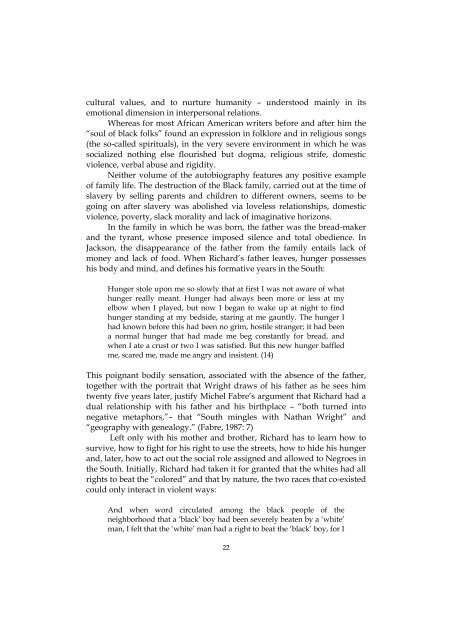translation studies. retrospective and prospective views
translation studies. retrospective and prospective views
translation studies. retrospective and prospective views
Create successful ePaper yourself
Turn your PDF publications into a flip-book with our unique Google optimized e-Paper software.
cultural values, <strong>and</strong> to nurture humanity – understood mainly in its<br />
emotional dimension in interpersonal relations.<br />
Whereas for most African American writers before <strong>and</strong> after him the<br />
“soul of black folks” found an expression in folklore <strong>and</strong> in religious songs<br />
(the so-called spirituals), in the very severe environment in which he was<br />
socialized nothing else flourished but dogma, religious strife, domestic<br />
violence, verbal abuse <strong>and</strong> rigidity.<br />
Neither volume of the autobiography features any positive example<br />
of family life. The destruction of the Black family, carried out at the time of<br />
slavery by selling parents <strong>and</strong> children to different owners, seems to be<br />
going on after slavery was abolished via loveless relationships, domestic<br />
violence, poverty, slack morality <strong>and</strong> lack of imaginative horizons.<br />
In the family in which he was born, the father was the bread-maker<br />
<strong>and</strong> the tyrant, whose presence imposed silence <strong>and</strong> total obedience. In<br />
Jackson, the disappearance of the father from the family entails lack of<br />
money <strong>and</strong> lack of food. When Richard’s father leaves, hunger possesses<br />
his body <strong>and</strong> mind, <strong>and</strong> defines his formative years in the South:<br />
Hunger stole upon me so slowly that at first I was not aware of what<br />
hunger really meant. Hunger had always been more or less at my<br />
elbow when I played, but now I began to wake up at night to find<br />
hunger st<strong>and</strong>ing at my bedside, staring at me gauntly. The hunger I<br />
had known before this had been no grim, hostile stranger; it had been<br />
a normal hunger that had made me beg constantly for bread, <strong>and</strong><br />
when I ate a crust or two I was satisfied. But this new hunger baffled<br />
me, scared me, made me angry <strong>and</strong> insistent. (14)<br />
This poignant bodily sensation, associated with the absence of the father,<br />
together with the portrait that Wright draws of his father as he sees him<br />
twenty five years later, justify Michel Fabre’s argument that Richard had a<br />
dual relationship with his father <strong>and</strong> his birthplace – “both turned into<br />
negative metaphors,”– that “South mingles with Nathan Wright” <strong>and</strong><br />
“geography with genealogy.” (Fabre, 1987: 7)<br />
Left only with his mother <strong>and</strong> brother, Richard has to learn how to<br />
survive, how to fight for his right to use the streets, how to hide his hunger<br />
<strong>and</strong>, later, how to act out the social role assigned <strong>and</strong> allowed to Negroes in<br />
the South. Initially, Richard had taken it for granted that the whites had all<br />
rights to beat the “colored” <strong>and</strong> that by nature, the two races that co-existed<br />
could only interact in violent ways:<br />
And when word circulated among the black people of the<br />
neighborhood that a ‘black’ boy had been severely beaten by a ‘white’<br />
man, I felt that the ‘white’ man had a right to beat the ‘black’ boy, for I<br />
22












